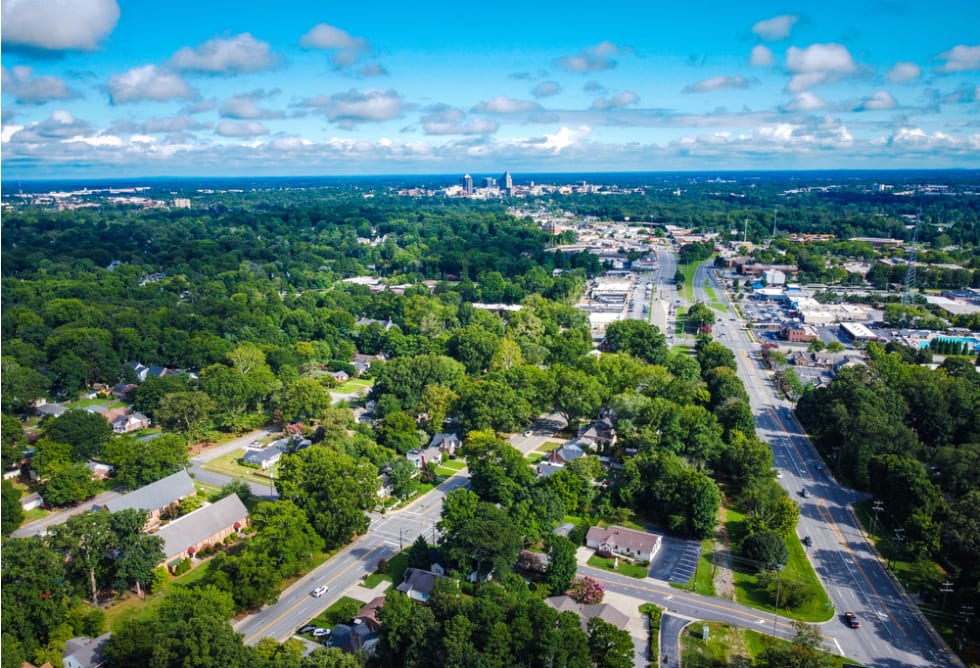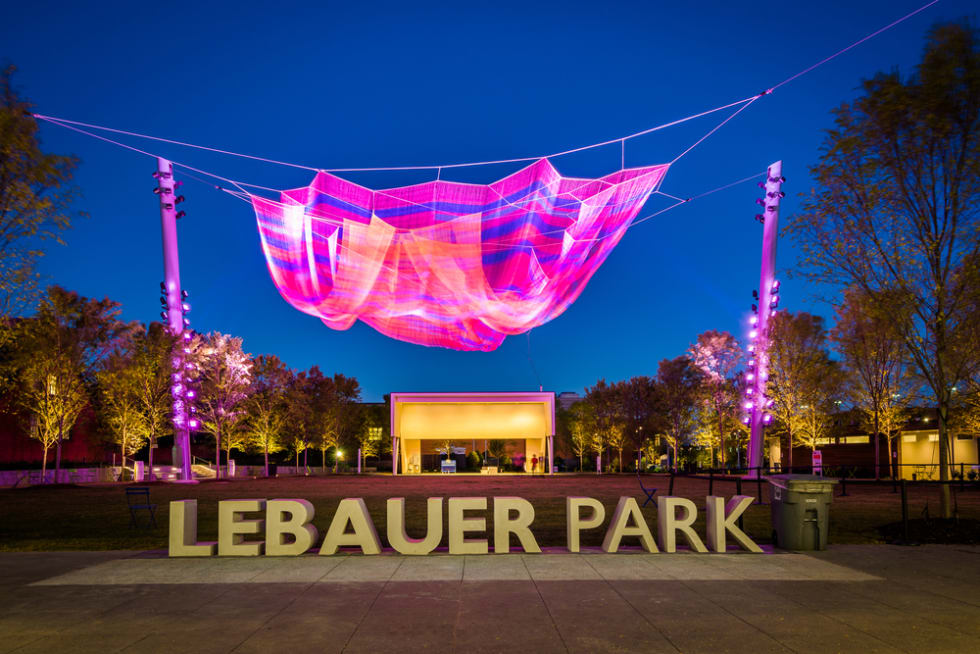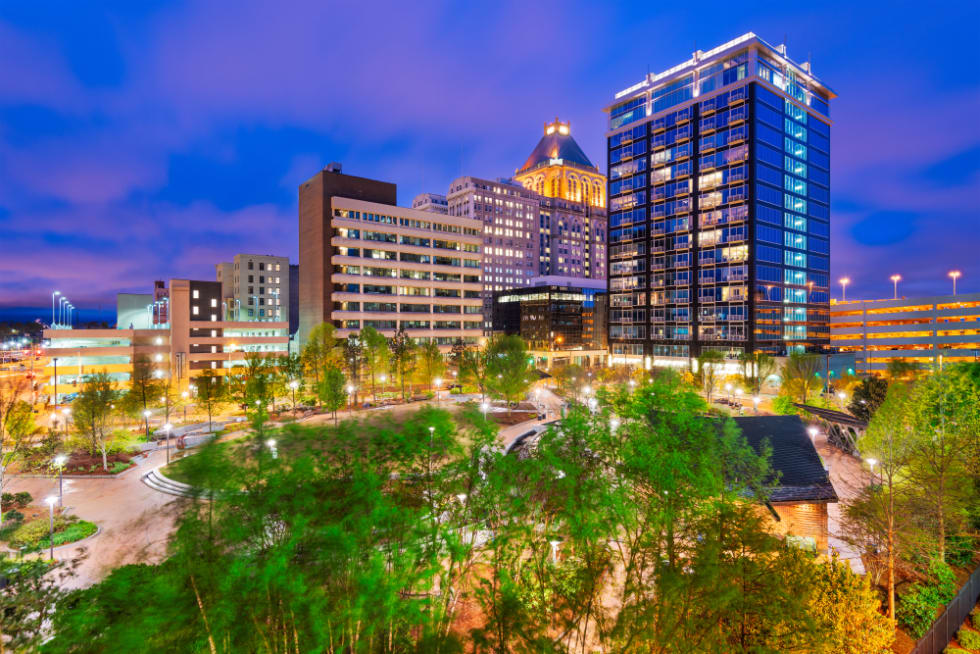Harmon Jefferson Village
- 18 units available
- 3 bed • 4 bed
- Amenities
In unit laundry, Patio / balcony, Pet friendly, Parking, Stainless steel, Pool + more

Greensboro is known as the Gate City for symbolic purposes, as it is located in the center of North Carolina. The city gained popularity in the late 1900s as the gateway to the West and South, seeing as many as 60 trains passing through daily.
Today, the city offers temperate weather year-round paired with an abundance of outdoor trails, lakes, and parks to enjoy. With Southern hospitality, a booming art scene, and incredible local restaurants, it’s no wonder Greensboro continues to be such a popular city.
Whether you’re looking to move to Greensboro to be a part of the evolving art scene, enjoy nature or a combination of both, you’ll want to get a good idea of your potential costs. Let’s take a closer look at the cost of living in Greensboro to understand better how much you need to live there.
According to Best Places, the cost of living in Greensboro is 15.8% cheaper than the U.S. average. North Carolina is the 24th most affordable state in the US. Good news for renters; Greensboro's housing costs and median home prices are significantly lower than the rest of the country.com and the state of North Carolina. Here's a breakdown of the cost of living in Greensboro:
| Cost of Living | Greensboro | North Carolina | U.S. |
|---|---|---|---|
| Overall | 84.2 | 91.0 | 100 |
| Grocery | 95.8 | 96.5 | 100 |
| Health | 93.1 | 107.2 | 100 |
| Housing | 66.4 | 83.1 | 100 |
| Median Home Cost | $229,900 | $289,300 | $338,100 |
| Utilities | 95.5 | 99.2 | 100 |
| Transportation | 75.3 | 83.9 | 100 |
| Miscellaneous | 110.3 | 89.2 | 100 |
Of course, where you live in Greensboro will impact your overall cost of living. A premier apartment downtown loaded with amenities will come at higher rents and housing costs than on the outskirts of the city.
Greensboro is home to neighborhoods and suburbs that command a higher cost of living, including Grandover. Depending on where you live, the average rent is $1,393 for a studio, $1,541 for a 1-bedroom, $1,917 for a 2-bedroom, and $2,279 for a 3-bedroom apartment.
If you're looking to save even more money in the Greensboro area, you can look to theaverage cost of living in Reidsville is 22.0% lower than the national average.
| Cost of Living | Reidsville | North Carolina | U.S. |
|---|---|---|---|
| Overall | 78.0 | 91.0 | 100 |
| Grocery | 92.8 | 96.5 | 100 |
| Health | 95 | 107.2 | 100 |
| Housing | 51.0 | 83.1 | 100 |
| Median Home Cost | $149,600 | $289,300 | $338,100 |
| Utilities | 100.6 | 99.2 | 100 |
| Transportation | 78.7 | 83.9 | 100 |
| Miscellaneous | 81.2 | 89.2 | 100 |
As of November 2024, the overall median rent in Greensboro stands at $1,133, after falling 1.0% last month. Despite the small decrease, prices still remain up 1.4% year-over-year.
After looking over ourrent report in Greensboro from November 2024, the median cost of a one-bedroom apartment is $1,001. Although there was a 1% decline in rents month-over-month, Greensboro’s rent growth over the past year has has outpaced both state (-2.6%) and national (-0.6%) averages.
If you need a little more space in Greensboro, you'll spend a median price of $1,115 as of November 2024.
The Greensboro housing market is also seeing steady growth, with median home prices currently at $229,900 according to data from Best Places. These prices fall far below competing areas like Cary, with a median price index of $574,400 and Raleigh at $427,000.

Use the 30% rule to find out how much gross income you need to comfortably live in any area based on rent prices. For example, if your rent is close to the median for a one-bedroom apartment in Greensboro at $1,001, according to the 30% rule, your monthly wages should be at least $3,336.67 a month, $20.51 per hour, or an annual salary of $40,040.
It's also wise to consider the living wage in Greensboro. According to MIT's data, the living wage in Greensboro $20.36 per hour, which is the basic wage needed to pay for essentials such as housing, food, and necessities. Just remember that this living wage does not account for extra costs like debt repayments, dining and entertainment.
Now let's look at the median household income in Greensboro. According to the U.S. Census bureau, that figure is $55,051 a year, $4,587.58 a month, or $28.61 a year. These figure puts you well within reach of only spending 30% on rent for the average apartment. For comparision, the median household income in the U.S. is $75,149 per year. However, your overall cost of living is significantly lower in Greensboro, especially for housing.
Keep in mind that recommended salaries are for a fairly basic lifestyle while in Greensboro. If you think you may have additional living costs, such as dining, entertainment, etc., you’ll need to anticipate these needs and search for a higher salary, a less expensive apartment, or both.
Thankfully, the typical annual salaries for common professions in Greensboro are highly competitive. The three highest typical annual salaries belong to Management, Computer, and Mathematical, and Architecture and Engineering positions, respectively.
If you're a single adult with no children, you'll spend about $9,427 for transportation in Greensboro over a year. However, if you’re a family of four, including two working adults and two children, you will pay $15,812 for transportation in one year.
Greensboro’s official public transportation operator is the Greensboro Transit Agency (GTA), covering 16 routes Mondays through Saturdays and seven on Sundays. The GTA also partners with local universities and colleges to provide the Higher Education Area Transit (HEAT), adding another five routes to local institutions.
With the GTA’s and HEAT’s combined efforts, public transportation in Greensboro covers over two million revenue-earning miles per year with 1,056 GTA bus stops and 46 HEAT bus stops throughout Greensboro and Jamestown.
One ride for single riders on GTA costs $1.50 or $0.75 for discounted riders, including seniors 65+, Medicare, Medicaid, children ages 6-17, persons with disabilities, and veterans. Children five and under and transfer riders will ride for free. For frequent riders, one-day unlimited ride passes cost $4, while a regular 31-day unlimited ride pass costs $58.
While public transportation in Greensboro is highly dependable and likely the most cost-effective method of getting around the city, others might utilize other available options, such as ridesharing services like Uber and Lyft. There are also taxis, car rentals, and chauffeur services, but these tend to be the more expensive options.
Expect to spend at least $4,113 on food per year for single adults without children in Greensboro. However, if you're a family of four with two working adults and two children, you can expect to pay $12,089 per year for food.
Greensboro offers countless dining options, including bistros, grills, and southern kitchens. Eating out in Greensboro costs an average of $15 for a meal at an inexpensive restaurant, while a three-course dinner for two people at a mid-range restaurant will run $65 without alcohol or dessert.
You can anticipate spending around or slightly below the national average for food items regarding grocery market pricing. For example, one gallon of regular milk will run you $3.45 in the grocery store, with the national average being $3.87.
You will also want to account for proper medical care when planning your budget in Greensboro. A single adult without children will pay around $3,109 for medical care over the year, while two working adults with two children will pay $10,478.
Whether you have a medical condition that requires you to see a doctor regularly or go in for your annual checkups, having medical insurance helps keep these costs minimum. Additionally, should any emergencies arise in your new hometown, it is nice to know you’ll be able to afford to have the proper care as needed.

With an average of 217 days of sun each year, more than the national average of 205, Greensboro has some incredible weather. Though unfortunately, you'll still pay a bit more than the U.S. average for utilities. Here is a breakdown of those costs by category along with comparisons to other North Carolina cities:
| Location | Avg Electricity Cost | Avg Gas Cost | Avg Water Cost | Avg Fuel Cost | Avg Total Cost |
|---|---|---|---|---|---|
| Asheville, NC | 150.32 | 81.78 | 51.52 | 26.54 | 310.16 |
| Charlotte, NC | 125.24 | 79.27 | 56.94 | 20.41 | 281.85 |
| Greensboro, NC | 135.01 | 40.40 | 78.84 | 3.43 | 257.69 |
| Raleigh, NC | 121.13 | 39.08 | 68.35 | 2.85 | 231.40 |
| Winston-Salem, NC | 143.86 | 30.85 | 25.21 | 7.64 | 207.56 |
| North Carolina | 157.73 | 35.82 | 33.82 | 2.83 | 230.21 |
To stay warm through the relatively cool winter nights, you'll need to account for higher utilities. Greensboro’s basic utilities include electricity, heating, cooling, water, and garbage, running 148.09 for a 915-sq. ft. apartment. Adding on a cell phone plan and the Internet with 60 Mbps or more with unlimited data, cable/ADSL will cost you an extra $129.25 for a total of $277.34 each month.
Get a better idea of how much utilities will cost in an apartment before you move. That way, you can be sure to budget accordingly for this sometimes overlooked expense.
Greensboro has plenty of fitness and entertainment opportunities for people enjoying a broad scope of activities. However, if you like to spend your time in a local gym for workouts, you’ll want to consider club membership costs. Thankfully, these costs are relatively low, with the monthly fee for a fitness club membership for one adult costing $45 a month.
Otherwise, you can easily enjoy the beautiful outdoor scenery Greensboro has to offer, as weather typically permits throughout the year. Enjoy one of the 124 park facilities within the city, including The Bog Garden, the Greensboro Arboretum, or the Country Park. For those with kids, have a fun day at popular playgrounds like the Arboretum Lindley Park Playground, the Cascade Park Playground, or the LeBauer Park Playground.
On warmer days, if you’re looking to enjoy some free air conditioning, a seat at the local cinema will cost you $15 without snacks or drinks. Of course, you can always check out the Greensboro History Museum, the Weatherspoon Art Museum, or the Ambleside Gallery if you’re trying to save some cash.
North Carolina has a flat state income tax rate of 5.25%. Luckily for anyone looking to purchase, the effective property tax rate is below the national average. Sales taxes in North Carolina are 4.75% but add up to 6.75% in Greensboro when combining state, county, and city sales tax rates.
Other expenses to look out for, especially for anyone moving out of state, including cross-country movers, storage, hotels, and transportation. These moves also often require additional fees such as apartment application fees, security deposits, pet deposits, and other add-ons. Furnishing your home is another considerable expense, which adds up quickly once you get started. Find tips and tricks on decorating your apartment on a budget to help keep you in line with your budget.

The current job market in Greensboro might not be the best situated compared to other similarly sized metropolitan areas. The current unemployment rate in Greensboro is slightly higher than the national average of 3.6% and is currently sitting at 4.4%. According to the U.S. Census Bureau, the median household income in Greensboro is $51,667.
The top employers in the city of Greensboro include Guilford County Schools and the Moses H. Cone Memorial Hospital. There are also plenty of employment options thanks to the many local colleges and universities in the area.
The most significant industry in Greensboro is health care and social assistance, employing over 45,600 residents. Next up is administrative and support and waste management and remediation services, employing 29,400 finance and insurance employing 13,600.
If you are interested in moving to a city full of art, nature, and southern charm, Greensboro might be the place for you. With a relatively low cost of living and beautiful year-round weather, it’s hard to resist. Register with Apartment List today and start checking out the thousands of available apartments to rent in Greensboro!
If you're interested in exploring other cities in North Carolina, check out our best places to live in NC blog! If Greensboro seems too pricey, learn about the cheapest places to live in NC.
According to our latest rent report data, the median price for a one bedroom apartment in Greensboro costs $1,001. A two bedroom apartment in Greensboro costs $1,115 per month.
A one bedroom apartment is the cheapest rent you can get in Greensboro, with the median rent sitting at $1,001.
Living in Greensboro is relatively affordable. In Greensboro, rent averages $1,080 for a one bedroom apartment. Transportation costs in Greensboro amount to $5,447 a year. Food costs $3,926 a year on average for a single resident of Greensboro.
Greensboro is 93 miles away from Charlotte. It takes 1 hour and 28 minutes to get to Charlotte from Greensboro by car, 9 hours by bike, and 31 hours by foot.
According to the U.S. Census Bureau, the population of Greensboro is 302,296. It is the third-most populated city in the state of North Carolina.
According to the U.S. Census Bureau, the median household income in Greensboro is $55,051.
However, to live comfortably in a one bedroom apartment in Greensboro, you should spend no more than 30% of your take home pay on rent. If a one bedroom apartment costs $1,001, you should earn $40,040 a year. If you live in a two bedroom apartment that costs $1,115, you should earn at least $44,600 a year.


In unit laundry, Patio / balcony, Pet friendly, Parking, Stainless steel, Pool + more
W/D hookup, Patio / balcony, Granite counters, Dishwasher, Pet friendly, 24hr maintenance + more